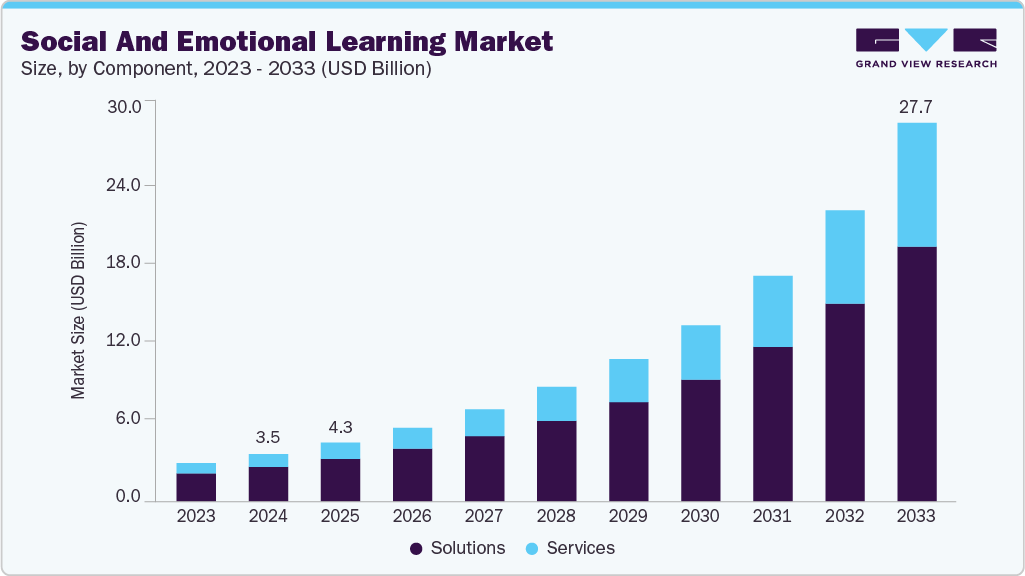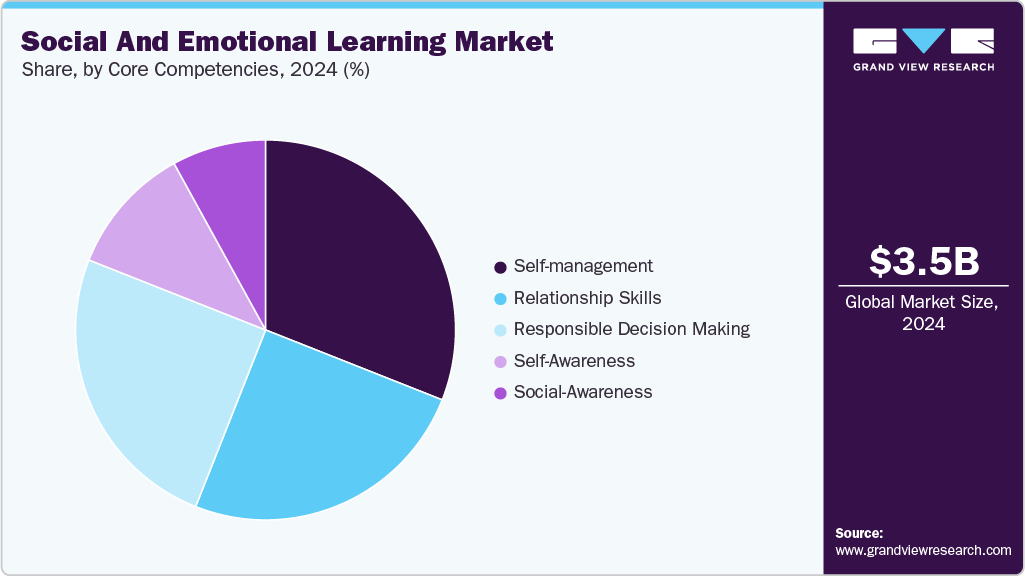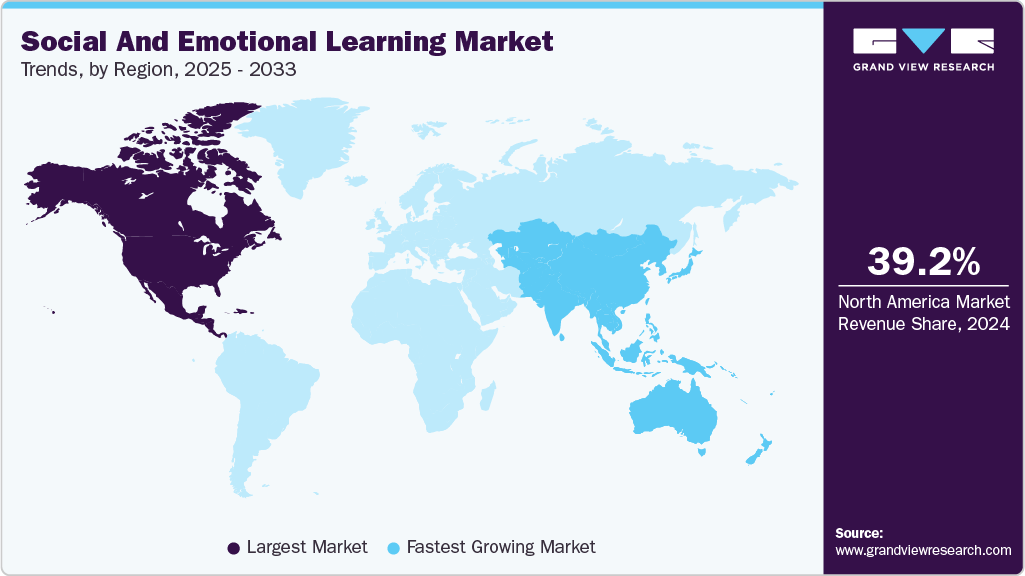- Home
- »
- Next Generation Technologies
- »
-
Social And Emotional Learning Market, Industry Report, 2033GVR Report cover
![Social And Emotional Learning Market Size, Share & Trends Report]()
Social And Emotional Learning Market (2025 - 2033) Size, Share & Trends Analysis Report By Component (Solutions, Services), By End-use (Pre-K, Elementary Schools), By Type (Web-based, Application), By Core Competencies (Social Awareness, Relationship Skills), By Region, And Segment Forecasts
- Report ID: GVR-4-68040-077-9
- Number of Report Pages: 100
- Format: PDF
- Historical Range: 2021 - 2023
- Forecast Period: 2025 - 2033
- Industry: Technology
- Report Summary
- Table of Contents
- Segmentation
- Methodology
- Download FREE Sample
-
Download Sample Report
Social And Emotional Learning Market Summary
The global social and emotional learning market size was estimated at USD 3.47 billion in 2024 and is projected to reach USD 27.73 billion by 2033, growing at a CAGR of 26.2% from 2025 to 2033. Social and emotional learning is the process through which youth, children, and adults effectively acquire the attitudes, knowledge, and skills necessary to manage and understand emotions, feel and show empathy for others, make responsible decisions, achieve positive goals, and maintain positive relationships.
Key Market Trends & Insights
- North America dominated the global social and emotional learning market with the largest revenue share of 39.2% in 2024.
- The social & emotional learning market in the U.S. accounted for the largest market revenue share in North America in 2024.
- By component, the solutions segment led the market with the largest revenue share of 72.8% in 2024.
- By type, the web-based segment led the market with the largest revenue share of 57.0% in 2024.
- By end-use, the pre-K segment is expected to grow at the fastest CAGR of 28.5% from 2025 to 2033.
Market Size & Forecast
- 2024 Market Size: USD 3.47 Billion
- 2033 Projected Market Size: USD 27.73 Billion
- CAGR (2025-2033): 26.2%
- North America: Largest market in 2024
- Asia Pacific: Fastest growing market
Social and emotional learning (SEL) is defined as the process by which individuals apply and acquire core skills in five interrelated areas namely social-awareness, self-management, self-awareness, relationship skills, and responsible decision making.Parents provide excellent support for their children's social and emotional development. Still, a network of support for building social and emotional competencies in children must be made through coordination between school staff, families, and community resources. These skills are actively reinforced in the classroom through extracurricular activities, support services, after-school activities, and service-learning programs. SEL also improves students' social and emotional competence by fostering learning environments that are caring, safe, well-managed, cooperative, and interactive.

Social and emotional learning (SEL) adoption as part of the core curriculum is being promoted by associations and governments. In the U.S., Federal policy plays a vital role in creating conditions that promote districtwide and statewide adoption of SEL so all students could benefit. Further, the policy promotes SEL for students, supports adults' SEL capacity building and competencies, and aligned efforts that leverage community assets and school to support the social, behavioral, and emotional needs of students and families. One of the most prevalent SEL strategies entails training teachers with the ability to teach social and emotional skills explicitly, then identifying opportunities for students to practice those skills throughout the day.
Growing adoption of smart devices and increase in digitalization in the education sector accelerate market growth. With the digitization of the educational sector, social and emotional education is also playing a significant role in the modernization and reformation of the educational environment globally. Further, government initiatives to promote digital infrastructure are accountable for driving the adoption of social and emotional learning. The emergence of augmented reality, artificial intelligence, and virtual reality technologies would provide an immersive social and emotional learning experience that would keep students engaged in their studies and motivate them to learn. AI can also be implemented to build an AI-based mentor who can assist students with grasping ideas, recommend courses, and provide feedback to enhance their learning experience.
Component Insights
The solutions segment led the market with the largest revenue share of 72.8% in 2024. The high share can be attributed due to widely used SEL solutions across emerging and developed economies and can be deployed in places with poor internet connectivity. They are useful tools for educators to assist students in learning academic and non-cognitive skills. Other growth-promoting aspects include several type developments, such as incorporating SEL platforms with virtual reality (VR), artificial intelligence (AI), and Pre-K computing technologies. Further, the market's expansion is also aided by the widespread use of computing Type in the kindergarten to 12th grade (K-12) sector
The services segment is predicted to foresee at the fastest CAGR during the forecast period. SEL services comprise training and support, consulting, and End use & integration. These services encourage educational institutions and other organizations with high integration capabilities to seek out applications. Several publishers provide books for children's social and emotional development that employ the SEL approach to help students acquire critical skills that will be effective in the classroom and throughout their lives. Many schools have implemented a whole-child system for SEL services to help students deal with stress and trauma.
End-use Insights
The middle & high schools segment accounted for the largest market revenue share in 2024. Educational advocates, such as teachers, principals, legislators, and parents, have shown enormous interest in implementing social and emotional learning solutions crosswise in middle & high schools for the development of students' academic and social skill sets. Implementing SEL in middle & high school helps students recognize stress and different strategies to help them choose what approach might work for them and help manage them. SEL teaches students critical life skills to create a positive learning environment where all students can learn and thrive in a classroom and have resources. For instance, teaching students about respect and empathy will help develop a sense of community and a supportive environment supporting learning. Programs for social and emotional learning generally strive to encourage what is best for students' academic, social, and emotional development.
The pre-k segment is expected to grow at the fastest CAGR during the forecast period, owing to the rising usage of engaging education methodologies such as animated SEL programs and interactive gaming, which act as a catalyzing factor for the segment's growth. The corporate segment is expected to showcase significant growth over the forecast period, as integrating social and emotional learning in the workplace supports the development and building of five competencies in employees. For instance, an employee with a high level of relationship skills and self-awareness, such as good relationship building or communication, will be able to process a change in the workplace that they find distressing in a constructive way. Collective wellness, equity, and social-emotional intelligence have to be at the core of this work to establish inclusive and conducive work environments that are secure and safe for employees.
Type Insights
The web-based segment accounted for the largest market revenue share of 57.0% in 2024, the growth is attributed to factors contributing to the increased adoption of digital transformation in K-12 schools. The web-based platform helps educators effectively drive collaboration and participation, empowering students and teachers to engage with content safely and confidently. Teachers can access private messaging and video conferencing to nurture the class community and help foster SEL skills whether students are learning from another location or inside the classroom.
The application segment is anticipated to witness at the fastest CAGR during the forecast period, as it offers numerous resources and tools to help students enhance their social and emotional literacy. SEL applications teach listening, emotions, communication, and kindness skills to all. The social and emotional learning interactive app assists children in learning, dealing with their own emotions, and understanding why they experience many emotions. These applications allow students to overcome and cope with what they are going through.
Core Competencies Insights
The self-management segment accounted for the largest market revenue share in 2024. Self-management in social and emotional learning (SEL) is gaining strong momentum as schools and organizations recognize its role in building emotional intelligence and resilience. It focuses on helping individuals regulate emotions, manage stress, set goals, and make responsible decisions-skills increasingly valued in both education and workplaces. With growing awareness around mental well-being, SEL programs now integrate mindfulness, time management, and emotional control techniques. This growing emphasis on self-management is fostering more balanced, focused, and empathetic learners and professionals across the globe.

The relationship skills segment is anticipated to witness at the fastest CAGR during the forecast period. These skills involve listening actively, resisting inappropriate social pressure, communicating clearly, seeking help, and negotiating conflict constructively. Relationship skills are vital to human development, equipping students with the abilities, skills, and knowledge to solve problems, build positive relationships and make intelligent decisions. Furthermore, establishing leadership abilities is a significant aspect of the social-emotional learning module on interpersonal skills. Instilling such abilities entails fostering a sense of social justice and being capable of speaking up for the interests and rights of others, in addition to learning how to guide a group of people toward a common goal.
Regional Insights
North America led the global social and emotional learning market with the largest revenue share of 39.2% in 2024. Developed countries like Canada and the U.S. drive the market's growth. Many provinces in Canada, U.S. & Mexico are adopting social and emotional learning solutions and programs in their education. Governments in the North American region are investing more in the implementation of SEL capabilities. These factors would boost demand for different SEL solutions and software.

U.S. Social And Emotional Learning Market Trends
The social and emotional learning market in the U.S. accounted for the largest market revenue share in North America in 2024, Social and Emotional Learning (SEL) in the U.S. is gaining strong momentum as schools and workplaces increasingly recognize the importance of emotional intelligence, empathy, and interpersonal skills. Educational institutions are integrating SEL into curriculums to improve student well-being, classroom behavior, and academic outcomes. The adoption is also expanding beyond schools, with corporations using social and emotional learning frameworks for leadership and team development. Government initiatives and nonprofit programs are promoting SEL to address issues like bullying, stress, and mental health.
Europe Social And Emotional Learning Market Trends
The social and emotional learning market in Europe is gaining strong traction across Europe as schools and policymakers increasingly recognize its role in fostering emotional intelligence, empathy, and mental well-being among students. The rise in youth mental health awareness, along with EU-backed education reforms, is accelerating the integration of SEL programs into curricula. Countries like the UK, Finland, and the Netherlands are leading adoption through digital platforms and teacher training initiatives. Corporate wellness programs and higher education institutions are also embedding SEL principles to build resilient, collaborative environments. Overall, social and emotional learning in Europe is transitioning from a niche concept to a mainstream educational and workplace priority.
Asia Pacific Social And Emotional Learning Market Trends
The social and emotional learning market in Asia Pacific is anticipated to grow at the fastest CAGR during the forecast period. The leading players in the APAC SEL market are focusing on growing their raising investments, product portfolios, e-learning solutions, increasing the proliferation of distance education, and strategic partnerships to create both robust and easy functionality. The market expansion is further aided by online courses and programs provided by schools, colleges, and universities. In addition, it enables the market to adapt to APAC countries' diverse educational needs, such as China, India, Japan, South Korea, India, Australia, and Southeast Asian countries. Further, one of the key factors driving the growth of the APAC region's social and emotional learning industry is the increasing adoption of various cutting-edge technologies and solutions by educational institutions and schools.
Key Social And Emotional Learning Company Insights
Some key companies in the global social & emotional learning industry are Positive Action, Inc.; 7 Mindsets SchoolMint and more.
-
Imagine Learning is a U.S.-based educational Type company that delivers digital-first, K-12 learning solutions grounded in research and adaptive design. In addition to core academic offerings across literacy, math, STEM, intervention, and assessments, the company provides an SEL program called Imagine Purpose, which fosters social-emotional skills like self-awareness, emotional regulation, relationship skills, and responsible decision-making, aligned with CASEL’s five competencies. Imagine Learning also extends its SEL impact beyond classroom walls via the Imagine Learning Foundation, which supports community and out-of-school SEL initiatives through grants and partnerships aimed at promoting learner well-being.
-
Positive Action, Inc. develops a widely used evidence-based SEL and character education program that has been adopted in over 25,000 schools and community sites across the U.S. and internationally. Founded in 1982 (building on work since 1973), the organization emphasizes holistic student development, integrating emotion regulation, self-concept, conflict resolution, and positive behavior in its curriculum. It offers grade-level curricula (PreK through high school), professional development, whole-school reform services, and support tools to reduce problematic behaviors (e.g. absenteeism, bullying) while promoting social-emotional growth.
Key Social And Emotional Learning Companies:
The following are the leading companies in the social and emotional learning market. These companies collectively hold the largest market share and dictate industry trends.
- Imagine Learning LLC.
- Positive Action, Inc.
- 7 Mindsets
- SchoolMint
- EVERFI, Inc.
- Playworks
- Rethink.
- Truworth
- Future of SEL.
- True Colors
Recent Developments
-
In March 2024, Positive Action, Inc. has launched Pasela™, a new digital, interactive SaaS platform that enables seamless, fully digital implementation of its evidence-based social and emotional learning (SEL) curriculum. Designed for PreK through high school (including family editions), Pasela delivers over 2,000 scientifically validated lessons via a unified web interface, accessible on desktops and mobile devices. The platform features a Content Genome tool to help educators plan, filter, and navigate lessons across topics and domains. By increasing scalability and ease of use, Pasela aims to expand Positive Action’s reach in helping schools address absenteeism, bullying, school climate, and student well-being.
Social And Emotional Learning Market Report Scope
Report Attribute
Details
Market size value in 2025
USD 4.32 billion
Revenue forecast in 2033
USD 27.73 billion
Growth rate
CAGR of 26.2% from 2025 to 2033
Base year for estimation
2024
Historical data
2021 - 2023
Forecast period
2025 - 2033
Quantitative units
Revenue in USD million/billion and CAGR from 2025 to 2033
Report coverage
Revenue forecast, company ranking, competitive landscape, growth factors, and trends
Segments covered
Component, end-use, type, core competencies, region
Regional scope
North America, Europe, Asia Pacific, Central & South America, MEA
Country scope
U.S.; Canada; Mexico; Germany; UK; France; China; India; Japan; Brazil.
Key companies profiled
Imagine Learning LLC.; Positive Action, Inc.; 7 Mindsets; SchoolMint; EVERFI, Inc.; Playworks; Rethink.; Truworth; Future of SEL.; True Colors
Customization scope
Free report customization (equivalent up to 8 analysts working days) with purchase. Addition or alteration to country, regional & segment scope.
Pricing and purchase options
Avail customized purchase options to meet your exact research needs. Explore purchase options
Global Social And Emotional Learning Market Report Segmentation
This report forecasts revenue growth at global, regional, and country levels and provides an analysis of the latest industry trends in each of the sub-segments from 2021 to 2033. For this study, Grand View Research has segmented the global social and emotional learning market report based on component, end-use, type, core competencies, and region:
-
Component Outlook (Revenue, USD Million, 2021 - 2033)
-
Solutions
-
Social and Emotional Learning Platform
-
Social and Emotional Learning Assessment Platform
-
-
Services
-
Consulting
-
End use and Integration
-
Training and Support
-
-
-
End-use Outlook (Revenue, USD Million, 2021 - 2033)
-
Pre-K
-
Elementary Schools
-
Middle & High Schools
-
Corporate
-
-
Type Outlook (Revenue, USD Million, 2021 - 2033)
-
Web-based
-
Application
-
-
Core Competencies Outlook (Revenue, USD Million, 2021 - 2033)
-
Self-Awareness
-
Self-Management
-
Social Awareness
-
Relationship Skills
-
Responsible Decision-Making
-
-
Regional Outlook (Revenue, USD Million, 2021 - 2033)
-
North America
-
U.S.
-
Canada
-
Mexico
-
-
Europe
-
UK
-
Germany
-
France
-
-
Asia Pacific
-
China
-
Japan
-
India
-
-
Central & South America
-
Brazil
-
-
MEA
-
Frequently Asked Questions About This Report
b. The global social and emotional learning market size was estimated at USD 3.47 billion in 2024 and is expected to reach USD 4.32 billion in 2025.
b. The global social and emotional learning market is expected to grow at a compound annual growth rate of 26.2% from 2025 to 2030 to reach USD 27.73 billion by 2030.
b. North America dominated the social and emotional learning market with a share of 39.2% in 2024. This is attributable to the countries such as Canada, U.S. & Mexico are adopting social and emotional learning solutions and programs in their education.
b. Some key players operating in the social and emotional learning market include Imagine Learning LLC., Positive Action, Inc., 7 Mindsets, SchoolMint, EVERFI, Inc., Playworks, Rethink., Truworth, Future of SEL., True Colors
b. Key factors that are driving the social and emotional learning market growth include increasing demand for social and emotional learning tools and software, need for social and emotional development in educational institutions.
Share this report with your colleague or friend.
Need a Tailored Report?
Customize this report to your needs — add regions, segments, or data points, with 20% free customization.

ISO 9001:2015 & 27001:2022 Certified
We are GDPR and CCPA compliant! Your transaction & personal information is safe and secure. For more details, please read our privacy policy.
Trusted market insights - try a free sample
See how our reports are structured and why industry leaders rely on Grand View Research. Get a free sample or ask us to tailor this report to your needs.










